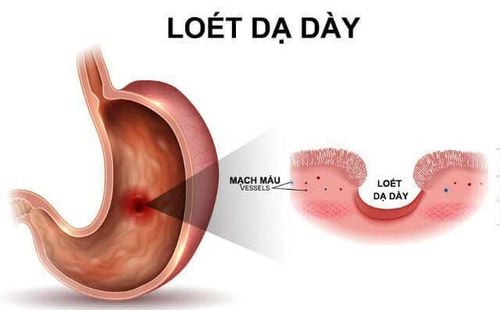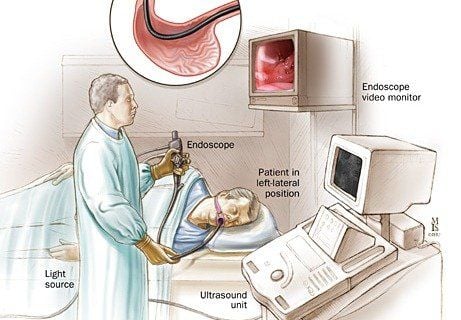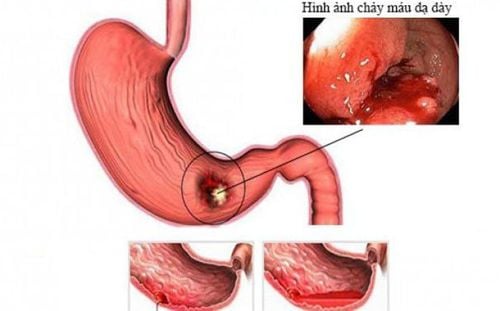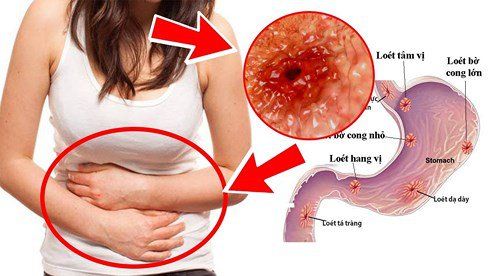This is an automatically translated article.
The article was professionally consulted by Doctor Department of Medical Examination & Internal Medicine - Vinmec Hai Phong International General Hospital.
Gastrointestinal endoscopy is a method of screening and accurately detecting lesions occurring in the digestive tract that are difficult to detect with other diagnostic methods. The upper gastrointestinal tract is the part that suffers more damage that is likely to develop into cancer if not detected and treated early by upper gastrointestinal endoscopy.
1. What is the upper digestive tract? Warning signs of disease in the upper gastrointestinal tract
The upper digestive tract includes the esophagus, stomach, and upper part of the small intestine called the duodenum. When there are typical signs such as severe epigastric pain, burning sensation, when the weather changes, dizziness, lightheadedness, fatigue, bad voice, nausea, vomiting... You may have had problems with your upper gastrointestinal tract. Typically, upper gastrointestinal bleeding can be mentioned with specific manifestations such as:
Vomiting blood; Passing black stools; Dizziness, dizziness, fear; Tired, sometimes struggling; Rapid breathing, sweating; Urinary infrequent with anuria Severe upper gastrointestinal bleeding can cause shock, lethargy, cold extremities, sweating, rapid pulse, small difficult to detect, blood pressure drop below 80mmHg.
Causes of upper gastrointestinal disease include:
Stomach ulcers: Helicobacter pylori (H.pylori) infection and long-term use of nonsteroidal anti-inflammatory drugs such as aspirin and ibuprofen are common causes of stomach ulcers. thick. Esophageal varices: Cirrhosis is a common cause of esophageal varices. Mallory-Weiss syndrome: due to profuse vomiting, tearing of the lining of the esophagus, or increased intra-abdominal pressure due to cough, hernia, or congenital anomalies can also cause tearing. Gastritis: NSAIDs and other medications, infections, Crohn's disease, trauma Benign and cancerous tumors: Benign and cancerous tumors of the esophagus, stomach, or duodenum can cause bleeding.

2. What is Upper Gastrointestinal Endoscopy?
Upper gastrointestinal endoscopy is a procedure applied so that a specialist can clearly observe the condition of the patient's stomach, esophagus, and duodenum by inserting a flexible endoscope into the upper digestive tract. . This is the most effective procedure for the diagnosis and detection of diseases in the upper gastrointestinal tract.
3. The role of upper gastrointestinal endoscopy
Upper gastrointestinal endoscopy is used to diagnose, detect and treat diseases in the upper gastrointestinal tract including esophagus, stomach, duodenum. Specifically, upper gastrointestinal endoscopy to:
Detect symptoms: endoscopy helps find the cause of the above mentioned symptoms of the upper gastrointestinal tract Diagnose diseases of the gastrointestinal tract, condition health conditions such as anemia, bleeding, ulcers, diarrhea, early screening for cancer, pre-cancer of the digestive tract through taking tissue samples in the digestive tract for biopsies for testing Treatment, monitoring treatment Treatment: through gastrointestinal endoscopy, the specialist can understand the condition during the treatment, and at the same time, treat it directly through the endoscope such as burning blood vessels to stop bleeding, dilating the damaged esophagus. narrowing, clipping polyps or removing foreign bodies.
4. Preparation for upper gastrointestinal endoscopy
When indicated, there is a need for upper gastrointestinal endoscopy, the patient will be guided by the doctor as well as the nurse in detail steps to prepare thoroughly for an effective endoscopy process.
Specifically in cases, the doctor will ask to fast before the endoscopy from 4-8 hours before to make sure the stomach is clean before the procedure. This makes the process of observing the digestive tract easier and more accurate.
The patient may also be asked to stop taking certain medications such as anticoagulants a few days before the endoscopy. Because anticoagulants can increase the risk of bleeding during endoscopy. If you have chronic diseases such as heart disease, diabetes, high blood pressure, you need to inform your doctor for specific instructions on taking medication before the endoscopy.
5. Procedure for performing upper gastrointestinal endoscopy
Endoscopy is quick, usually in just 10 minutes. Depending on the case and needs of the patient, the doctor may or may not use anesthetic to ensure effective and safe endoscopy. The specialist will insert a flexible endoscope into the back of the throat and down into the stomach. From here, the scope will descend into the duodenum and show the entire interior of the upper gastrointestinal tract. Lesions, ulcers, bleeding, polyps... can be clearly observed, as well as performed biopsies for diagnosis and subsequent treatment.

With the upper gastrointestinal endoscopy method, the patient can completely recover within 1 hour if under anesthesia, otherwise the time to return to normal will be faster. After the colonoscopy, you may experience some bloating and discomfort, but these symptoms should go away quickly.
Currently, upper gastrointestinal endoscopy is an effective method for early diagnosis and detection of diseases in the upper gastrointestinal tract. Especially highly effective in screening digestive cancer.
At Vinmec Phu Quoc International General Hospital, the technique of upper gastrointestinal endoscopy in particular and endoscopy of the entire gastrointestinal tract in general has been applied and received many demands for using the procedure to detect, Diagnosis, treatment, effective monitoring and treatment of digestive diseases, as well as early digestive cancer screening.
The technique was performed by Dr. Nguyen Dinh Bao Long - Endoscopist, Department of Medical Examination & Internal Medicine, Vinmec Phu Quoc International General Hospital. With many years of experience in Examination and treatment of digestive diseases, endoscopic diagnosis and intervention of gastrointestinal diseases (stomach, colon...), gastrointestinal cancer screening through endoscopy. At the same time, the doctor is also a member of the Vietnam Association of Gastrointestinal Endoscopy.
Vinmec Phu Quoc uses the Olympus CV 180 machine to diagnose and detect tumors and polyps that are at risk of developing into cancer so that they can be treated as soon as possible.
Please dial HOTLINE for more information or register for an appointment HERE. Download MyVinmec app to make appointments faster and to manage your bookings easily.













